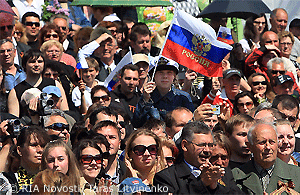Middle class to dominate in Russia by 2020, its parties to be victorious in parliamentary election - report
"The middle class will grow from 26% to 33% of the total Russian population and from 33% to 45% of adults by 2019. The overwhelming majority of urban residents [60-70% of the total population] will belong to the middle class," the report said. "In fact, this means that the absolute majority of Russian adults will belong either to the middle class or its periphery by 2020," it said. "By the end of this decade, the middle class electorate will dominate the opposite social pole," the expert said. They noted that the domination of the middle class and adjoining groups would occur for the first time ever in the national history. "As a result, parties oriented toward the middle class will be able to gain the majority of votes in federal parliamentary elections. Left-wing parties can be victorious only if they win over a part of the middle class and allied groups. Hence the process of party convergence will be boosted on the basis of middle class oriented programs," the report said. Candidates seeking victory in the 2018 presidential election will need to appeal directly to the middle class, it said. "The victory of a radical left-wing populist candidate in a competitive presidential election at the end of this decade will be highly unlikely due to the meager left-wing electorate," the report said. Risks to the steady functioning of competitive democracy will decline considerably and convergence of political forces around the dominating social policy will intensify by then, it said. "Further growth of the extra-systemic protest potential of the middle class is particularly dangerous for the system," the experts noted. This potential does not present a direct threat to the preservation of the political system as long as middle class protests are not political, they noted. Therefore experts predict two possible scripts for Russian political development. "The first medium-term scenario will be possible in the case of increasing discontent, in which middle class protests may enter the phase of political activity. In that case, large political parties may be formed and that will create the probability of early parliamentary elections," the expert said. The middle class ability to form a massive political movement within a brief period is not excluded. "This scenario implies the probability of, at least, an early parliamentary election. The probably of an early presidential election will be smaller," the experts said. "A freer parliamentary election will considerably broaden the formal political representation of the middle class by new political parties," they said. The second medium-term scenario is the slowing or even ende of protest activity on both poles. "In this case, the extra-systemic pressure on the authorities will weaken. The absence of such pressure will lead the limited self-development potential of the system to the conservation of its main features for the medium-term future. Then profound political transformations will be delayed until the end of the next decade and happen under the influence of long-term structural transformations in Russian society," the expert said. The Strategic Research Center was formed in 1999 and began working on national projects in 2003. It implements socioeconomic reforms at present. The center drafted the concept of national socioeconomic development for the period until 2010. 
file photoMOSCOW. Nov 10 (Interfax) - Political forces capable of winning over the middle class can count on their success in the federal election campaigns of the next decade, as the Russian middle class will grow, experts from the Strategic Research Center said in a report "Locomotive Forces and Prospects for Political Transformation in Russia."
Russia, Government, Politics - Russian News - Russia - Johnson's Russia List

